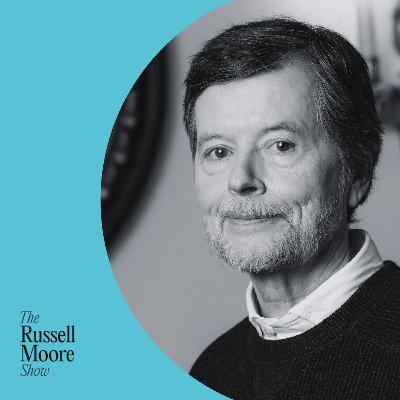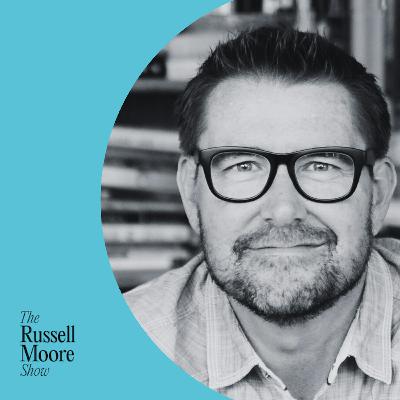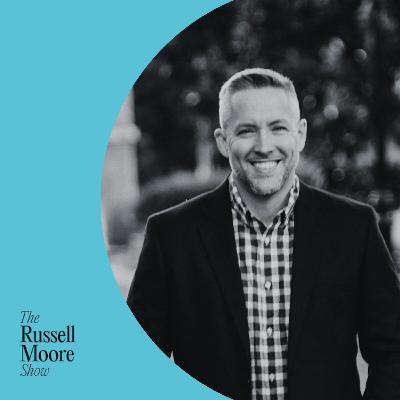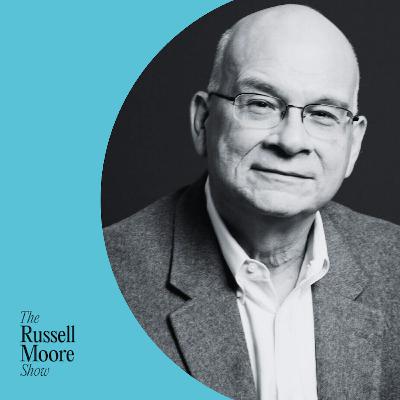Discover The Russell Moore Show
The Russell Moore Show

The Russell Moore Show
Author: Christianity Today, Russell Moore
Subscribed: 3,927Played: 87,469Subscribe
Share
© 2021 Christianity Today
Description
Listen in as Russell Moore, director of Christianity Today’s Public Theology Project and Editor-in-Chief, talks about the latest books, cultural conversations and pressing ethical questions that point us toward the kingdom of Christ.
411 Episodes
Reverse
Russell takes a listener's question about how a non-believer can meaningfully engage in a book group with Christians.
Watch the video of this episode on YouTube here.
Submit your own question for the show! Email questions@russellmoore.com — and remember: attach a voice memo!
Learn more about your ad choices. Visit podcastchoices.com/adchoices
What happens when a 17-year-old's dive into the Chesapeake Bay changes everything—and the healing never comes?
Watch the full conversation on YouTube.
Fifty-seven years later, Joni Eareckson Tada sits across from me with an answer that might undo everything you think you know about strength, suffering, and the strange mercy of God.
In this conversation marking the 35th anniversary of the Americans with Disabilities Act, we go where few dare: into the raw, daily reality of quadriplegia, chronic pain that would break most of us by breakfast, and a two-time battle with breast cancer. But this isn't inspiration porn. This is Joni—unflinching, funny, and fiercely honest about what it means when "I can do all things through Christ" meets 4 a.m. despair.
We talk about the crushing loneliness of being the only wheelchair in a room full of chairs. The rage when well-meaning Christians promise healing that doesn't come. The particular exhaustion of advocating for your own existence. And why she tells God some mornings, "I have no strength for today. Can I borrow yours?"
But we also discover something unexpected: how limitation becomes liberation. Why the disabled community might be the most honest place in America. And what happens when churches stop trying to "fix" people and start making room for them.
Fair warning: Joni doesn't do platitudes. She'll tell you exactly what not to say to someone in chronic pain (spoiler: "everything happens for a reason" isn't it). She'll explain why she's terrified of a world that's editing out Down syndrome. And she'll make you rethink whether your church's "all are welcome" sign means anything if there's no ramp to the door.
This is for anyone who's ever wondered where God is when the miracle doesn't come. For those caring for someone who's suffering and don't know what to say. For all of us who suspect our obsession with optimization and control might be making us miss the point entirely.
Come for the practical wisdom. Stay for the kind of hope that only comes from someone who's been asking "How long, O Lord?" for nearly six decades—and still believes the answer matters.
Keep up with Joni’s work through Joni and Friends, here.
Keep up with Russell:
Sign up for the weekly newsletter where Russell shares thoughtful takes on big questions, offers a Christian perspective on life, and recommends books and music he's enjoying.
Submit a question for the show at questions@russellmoore.com
Subscribe to the Christianity Today Magazine: Special offer for listeners of The Russell Moore Show: Click here for 25% off a subscription.
Learn more about your ad choices. Visit podcastchoices.com/adchoices
Russell takes a listener's question about whether God can still use prayers, and the conversation broadens to mind-breaking theology about God’s transcendence of time itself.
Watch the video of this episode on YouTube here.
Submit your own question for the show! Email questions@russellmoore.com — and remember: attach a voice memo!
Keep up with Russell:
Sign up for the weekly newsletter where Russell shares thoughtful takes on big questions, offers a Christian perspective on life, and recommends books and music he's enjoying.
Subscribe to the Christianity Today Magazine: Special offer for listeners of The Russell Moore Show: Click here for 25% off a subscription.
Learn more about your ad choices. Visit podcastchoices.com/adchoices
Ken Burns says the American Revolution is "the most important event in world history since the birth of Christ." That's a bold claim—especially in a moment when the word "patriot" has become a weapon and the experiment that revolution launched feels more fragile than ever.
In this conversation, Russell Moore sits down with the legendary documentarian to explore what eight years of wrestling with the founders can teach us about our fractured present. How do you love a country—or a church—while being honest about its deep hypocrisies? Can you hold together progress and permanence, hope and clear-eyed realism? And what does faithfulness look like when certainty has replaced faith?
Burns's new series, The American Revolution (premiering November 16 on PBS), attempts something audacious: telling a visual story from an era with no photographs, bringing to life the contradiction-filled men who proclaimed "all men are created equal" while many of them held other human beings in bondage. Using voices including Tom Hanks, Liev Schreiber, and Claire Danes, Burns creates a narrative that refuses both myth-making and cynicism.
Burns discusses with RDM why labels such as “Heritage American” and “Christian America” fail and what the founders actually believed about divine providence (hint: it wasn't what you think).
Along the way: Schoolhouse Rock nostalgia, baseball metaphors, and what it means to be a patriot when the word itself has been hijacked.
Watch the full conversation on YouTube.Resources mentioned in this episode:
Watch Burns’ “The American Revolution” on PBS for free starting November 16th.
Keep up with Russell:
Sign up for the weekly newsletter where Russell shares thoughtful takes on big questions, offers a Christian perspective on life, and recommends books and music he's enjoying.
Submit a question for the show at questions@russellmoore.com
Subscribe to the Christianity Today Magazine: Special offer for listeners of The Russell Moore Show: Click here for 25% off a subscription
Learn more about your ad choices. Visit podcastchoices.com/adchoices
Russell takes a listener's question about whether the work of fallen songwriters and authors should be used for worship.
Watch the video of this episode on YouTube here.
Submit your own question for the show! Email questions@russellmoore.com — and remember: attach a voice memo!
Keep up with Russell:
Sign up for the weekly newsletter where Russell shares thoughtful takes on big questions, offers a Christian perspective on life, and recommends books and music he's enjoying.
Subscribe to the Christianity Today Magazine: Special offer for listeners of The Russell Moore Show: Click here for 25% off a subscription.
Learn more about your ad choices. Visit podcastchoices.com/adchoices
What if the biggest changes in your life aren’t sudden at all—but have been building quietly for years?
Watch the full conversation on YouTube
In this episode, Russell Moore sits down with pastor and author Mark Batterson (National Community Church, Washington, D.C.; The Circle Maker, Gradually, Then Suddenly) to talk about how transformation, calling, and even faith itself often arrive–as Hemingway once put it–gradually, then suddenly. From hard decisions and hidden preparation to the slow work of God that looks instant only in hindsight, they explore why patience may be the most underrated spiritual discipline of all.
Batterson and RDM talk about the writings of Eugene Peterson on the “long obedience” of a faith journey, the difference between patience and stagnation, how to know when you’re called to something and when you’re released from it, and why celebrity culture in the church short-circuits character formation. They get practical on habits (why 30 days feels like the hardest part), preaching long obedience in a city addicted to immediacy, learning grit without “snowplow” spirituality, and aiming at legacy that’s measured by who others become because of you.
If you’re looking for wisdom without hurry, conviction without hype, and hope that can take a punch and keep walking, this is the episode for you.
Resources mentioned in this episode:
Mark Batterson, Gradually, Then Suddenly
Ernest Hemingway, The Sun Also Rises
Eugene Peterson, A Long Obedience in the Same Direction
Keep up with Russell:
Sign up for the weekly newsletter where Russell shares thoughtful takes on big questions, offers a Christian perspective on life, and recommends books and music he's enjoying.
Submit a question for the show at questions@russellmoore.com
Subscribe to the Christianity Today Magazine: Special offer for listeners of The Russell Moore Show: Click here for 25% off a subscription.
Learn more about your ad choices. Visit podcastchoices.com/adchoices
Russell takes a listener's question about the Church body convicting each other in love without unnecessary division.
Watch the video of this episode on YouTube here.
Submit your own question for the show! Email questions@russellmoore.com — and remember: attach a voice memo!
Keep up with Russell:
Sign up for the weekly newsletter where Russell shares thoughtful takes on big questions, offers a Christian perspective on life, and recommends books and music he's enjoying.
Subscribe to the Christianity Today Magazine: Special offer for listeners of The Russell Moore Show: Click here for 25% off a subscription.
Learn more about your ad choices. Visit podcastchoices.com/adchoices
David French checks in on a potpourri of important subjects.
Watch the full conversation on YouTube
For longtime friends Russell Moore and David French, talking about what’s happening and where things are going is virtually an everyday occurrence. This time, though, they decided to let us listen in. RDM refused to write notes to plan out this conversation and said, “Let’s just go on the air–unfiltered.” This is that conversation.
French, New York Times columnist and author, and RDM discuss everything from whether revival is happening among Gen Z to why we’ve seen such a backlash against women in evangelical circles to whether the gender identity disputes are not over to whether we are headed toward a dark place on questions of religious freedom.
Then they get personal—talking about why, after all they’ve each seen, they are still Christians, and what advice they would give to those who wonder if they still can be.
If you’re looking for honesty without despair and candor without cynicism, this is the episode for you.
Resources mentioned in this episode:
Richard Hanania article, ”The Based Ritual”
David’s article about his incurable disease in the New York Times, ”I Believe in Miracles. Just Not All of Them.”
Sign up for David’s newsletter
Keep up with Russell:
Sign up for the weekly newsletter where Russell shares thoughtful takes on big questions, offers a Christian perspective on life, and recommends books and music he's enjoying.
Submit a question for the show at questions@russellmoore.com
Subscribe to the Christianity Today Magazine: Special offer for listeners of The Russell Moore Show: Click here for 25% off a subscription
Learn more about your ad choices. Visit podcastchoices.com/adchoices
Russell takes a listener's question about church membership and the Communion table.
Watch the video of this episode on YouTube here.
Submit your own question for the show! Email questions@russellmoore.com — and remember: attach a voice memo!
Keep up with Russell:
Sign up for the weekly newsletter where Russell shares thoughtful takes on big questions, offers a Christian perspective on life, and recommends books and music he's enjoying.
Subscribe to the Christianity Today Magazine: Special offer for listeners of The Russell Moore Show: Click here for 25% off a subscription.
Learn more about your ad choices. Visit podcastchoices.com/adchoices
What if the real radicals right now are the ones who refuse to join the outrage mobs?
Watch the full conversation on YouTube
Russell Moore talks with pastor and author J.D. Greear about his new book Everyday Revolutionary and the surprising power of grace in an age addicted to “courage” and “clarity.” Starting with the story of how J.D. befriended the man who tried to dox him, the two dig into why Christian conviction without compassion turns hollow—and how ordinary believers can live with the kind of quiet strength that actually changes things.
They explore what witness looks like when the internet never blinks, what evangelism means in a world both secular and spiritual, why pastors burn out, and what might replace the megachurch in twenty years.
Plus: Hear about the one and only time Russell Moore has ever passed out.
Resources mentioned in this episode:
Everyday Revolutionary by J.D. Greear
Molly Worthen’s episode on our show
Keep up with Russell:
Sign up for the weekly newsletter where Russell shares thoughtful takes on big questions, offers a Christian perspective on life, and recommends books and music he's enjoying.
Submit a question for the show at questions@russellmoore.com
Subscribe to the Christianity Today Magazine: Special offer for listeners of The Russell Moore Show: Click here for 25% off a subscription.
Learn more about your ad choices. Visit podcastchoices.com/adchoices
Russell answers a listener’s question about making time to be a better writer
Watch the video of this episode on YouTube here.
Submit your own question for the show! Email questions@russellmoore.com — and remember: attach a voice memo!
Keep up with Russell:
Sign up for the weekly newsletter where Russell shares thoughtful takes on big questions, offers a Christian perspective on life, and recommends books and music he's enjoying.
Subscribe to the Christianity Today Magazine: Special offer for listeners of The Russell Moore Show: Click here for 25% off a subscription.
Learn more about your ad choices. Visit podcastchoices.com/adchoices
If you’ve ever wondered what a conversation about Ecclesiastes between Tigger and Eeyore sounds like, it’s your lucky day.
Watch the full conversation on YouTube
In a recent episode, Sho Baraka became the first guest to choose the book of Ecclesiastes for his Desert Island, “5 Books of the Bible” challenge we sometimes end our show with. So it seems fitting that a few weeks later we welcome Beth Moore to talk about the relevance and timeliness of these passages that weep for the seeming futility of the human experience.
Together, Russell and Beth begin by exploring the relevance of the book for Christians and non-Christians alike. Then, they go on a free-wheeling exploration of the book including topics like surgeries and abandoned vineyards, Christmas Wig Exchanges, Stephen King, and, amazingly, Creed Bratton (if you know, you know).
If you’ve ever had the thought, "I hate life,” and assumed the Bible was ignorant to the human experience of suffering, listen to hear how God has not only acknowledged the turmoil of our existential strivings, but has actually given us words for it.
Resources mentioned in this episode:
Chasing Vines by Beth Moore
The Lost Art of Dying by Dr. Lydia Dugdale
Living Life Backward: How Ecclesiastes Teaches Us to Live in Light of the End by David Gibson
Keep up with Russell:
Sign up for the weekly newsletter where Russell shares thoughtful takes on big questions, offers a Christian perspective on life, and recommends books and music he's enjoying.
Submit a question for the show at questions@russellmoore.com
Subscribe to the Christianity Today Magazine: Special offer for listeners of The Russell Moore Show: Click here for 25% off a subscription
Learn more about your ad choices. Visit podcastchoices.com/adchoices
Russell takes a listener's question about what we should call religious participants in the MAGA movement.
Watch the video of this episode on YouTube here.
Submit your own question for the show! Email questions@russellmoore.com — and remember: attach a voice memo!
Keep up with Russell:
Sign up for the weekly newsletter where Russell shares thoughtful takes on big questions, offers a Christian perspective on life, and recommends books and music he's enjoying.
Subscribe to the Christianity Today Magazine: Special offer for listeners of The Russell Moore Show: Click here for 25% off a subscription.
Learn more about your ad choices. Visit podcastchoices.com/adchoices
Retired NFL player Benjamin Watson has been on this show several times over the years, and he’s recently released his own podcast, The Just Life. Russell was a guest on the show, and together they talked about Russell’s background along with matters of justice, gospel-centered living, and faithful action. Check out Ben’s show here.
Resources mentioned in this episode:
Against the Machine: On the Unmaking of Humanity by Paul Kingsnorth
Savage Gods by Paul Kingsnorth
Buccmaster Trilogy by Paul Kingsnorth
Paul’s Essay, “The Cross and the Machine”
Keep up with Russell:
Sign up for the weekly newsletter where Russell shares thoughtful takes on big questions, offers a Christian perspective on life, and recommends books and music he's enjoying.
Submit a question for the show at questions@russellmoore.com
Subscribe to the Christianity Today Magazine: Special offer for listeners of The Russell Moore Show: Click here for 25% off a subscription.
Learn more about your ad choices. Visit podcastchoices.com/adchoices
Russell answers a listener’s question regarding why Christians are not stepping in to help with the humanitarian aid crisis, and what needs to change.
Watch the video of this episode on YouTube here.
Submit your own question for the show! Email questions@russellmoore.com — and remember: attach a voice memo!
Keep up with Russell:
Sign up for the weekly newsletter where Russell shares thoughtful takes on big questions, offers a Christian perspective on life, and recommends books and music he's enjoying.
Subscribe to the Christianity Today Magazine: Special offer for listeners of The Russell Moore Show: Click here for 25% off a subscription.
Learn more about your ad choices. Visit podcastchoices.com/adchoices
Lecrae joins Russell Moore to talk about reconstructing faith after crises of disillusionment.
Watch the full conversation on YouTube
Originally aired live on September 24th, Russell hosted a conversation for Christianity Today subscribers with Lecrae regarding his recent Christianity Today article, “An Exhortation to the Exhausted Black Christian.” They talk about Lecrae’s public life as a Christian hip hop artist and author, and his near deconstruction. Then, the floor was opened to questions from subscribers.
Listen to the recent episode with Paul Kingsnorth
Keep up with Russell:
Sign up for the weekly newsletter where Russell shares thoughtful takes on big questions, offers a Christian perspective on life, and recommends books and music he's enjoying.
Submit a question for the show at questions@russellmoore.com
Subscribe to the Christianity Today Magazine: Special offer for listeners of The Russell Moore Show: Click here for 25% off a subscription.
Learn more about your ad choices. Visit podcastchoices.com/adchoices
What if the world’s brightest engineers aren’t just building smarter tools—but opening a door to something older, darker, and more sinister?
In this episode of The Russell Moore Show, RDM sits down with Paul Kingsnorth—novelist, essayist, and former pagan turned Orthodox Christian—to talk about his searing new book Against the Machine: On the Unmaking of Humanity. Kingsnorth argues that the technologies we treat as neutral conveniences may, in fact, be spiritual weapons. The internet as a giant Ouija board. AI not as invention, but as invocation.
It sounds insane—until you realize the people creating these systems admit they don’t fully understand them either.
In this conversation, Kingsnorth tells the unlikely story of his journey from Wiccan witchcraft to baptism in the Orthodox Church, why he believes our cultural obsession with screens, sex, and selfhood is a trap, and why Christians in particular must stop treating technology as just another tool. What if it’s more than that? What if, in chasing progress, we’ve been summoning something we cannot control?
This isn’t your average hand-wringing about iPhones or social media. It’s a bracing, unsettling, and oddly hopeful dialogue about how to remain human in an age increasingly hostile to humanity itself.
Listen in if you’ve ever wondered:
Why AI feels less like a tool and more like a presence
How paganism and environmentalism can point toward, but never satisfy, the longing for God
What the “four pillars of the machine” are—and how they’re shaping us without our consent
Whether resistance to the machine is possible, and how communities of faith might embody it
Resources mentioned in this episode:
Against the Machine: On the Unmaking of Humanity by Paul Kingsnorth
Savage Gods by Paul Kingsnorth
Buccmaster Trilogy by Paul Kingsnorth
Paul’s Essay, “The Cross and the Machine”
Keep up with Russell:
Sign up for the weekly newsletter where Russell shares thoughtful takes on big questions, offers a Christian perspective on life, and recommends books and music he's enjoying.
Submit a question for the show at questions@russellmoore.com
Subscribe to the Christianity Today Magazine: Special offer for listeners of The Russell Moore Show: Click here for 25% off a subscription.
Learn more about your ad choices. Visit podcastchoices.com/adchoices
A conversation with Tim Keller from 2021, in honor of his birthday.
Watch the full conversation on YouTube.
Tim Keller would have turned 75 years old this week (September 23rd). To mark this, we are bringing back an episode from early in 2021 (back when the show was called Signposts). At the time of the conversation, Keller was a few months removed from learning of the cancer that eventually took his life and had just released a new book, Hope in Times of Fear: The Resurrection and the Meaning of Easter. They also talk about the recent article Tim wrote for The Atlantic, wrestling with mortality, how to order our loves in this life, and finding hope in the midst of suffering.
Ultimately, this is a conversation upholding the comfort of the resurrection, and reminds us that through it, nothing truly good is ever lost.
Keep up with Russell:
Sign up for the weekly newsletter where Russell shares thoughtful takes on big questions, offers a Christian perspective on life, and recommends books and music he's enjoying.
Submit a question for the show at questions@russellmoore.com
Subscribe to the Christianity Today Magazine: Special offer for listeners of The Russell Moore Show: Click here for 25% off a subscription.
Learn more about your ad choices. Visit podcastchoices.com/adchoices
Russell shares 30 things he’s learned in his 30 years of ordained ministry.
Watch the full episode on YouTube
This was originally shared in the Moore to the Point newsletter (sign up here), but Russell received so much feedback that it deserved its own episode.
Have feedback? Email questions@russellmoore.com. We’ll look forward to hearing from you.
Keep up with Russell:
Sign up for the weekly newsletter where Russell shares thoughtful takes on big questions, offers a Christian perspective on life, and recommends books and music he's enjoying.
Subscribe to the Christianity Today Magazine: Special offer for listeners of The Russell Moore Show: Click here for 25% off a subscription.
Learn more about your ad choices. Visit podcastchoices.com/adchoices
Another quarterly conversation on books with Christianity Today’s Editorial Director, Ashley Hales, on the subject of resisting the digital era.
Watch the full conversation on YouTube
What’s the role of reading in a screen-saturated, distracted, AI world?
Russell is joined once again by Ashley Hales, print editor at Christianity Today, to explore how literature can help us resist the attention-fractured nature of our technological era by offering unique ways to process real life itself, giving us tools to see grace where we least expect it.
Russell reflects on Wendell Berry’s latest (and perhaps final) Port William novel, Marce Catlett, and what it means to say goodbye to a lifelong literary companion. Ashley shares insights on Jan Karon’s return to Mitford, and the two discuss how stories shape our capacity for empathy, memory, and hope. They also highlight nonfiction works like Jonathan Haidt’s The Anxious Generation (check out our recent episode with Jon) and David Zahl’s The Big Relief, considering how books can guide us through exhaustion, anxiety, and the pressures of modern life. Then, the two share the stack of books they’re reading just for fun, and upcoming releases they’re looking forward to.You can find all the titles mentioned in the episode below.
Plus–Hear ye one and all!–Russell shares about an AI tool that he likes!
If you’ve ever wondered how exactly reading still matters in a world of constant noise, this episode makes the case that it does—perhaps now more than ever.
Resources mentioned in this episode:
Bookshelf App
Marce Catlett by Wendell Berry
My Beloved by Jan Karon
The Anxious Generation: How the Great Rewiring of Childhood Is Causing an Epidemic of Mental Illness by Jon Haidt
The Big Relief by David Zahl
Feminism Against Progress by Mary Harrington
Ashley’s CT article based on this book
Ct article about MAID in Canada
Pan by Michael Clune
Blaise Pascal: The Man Who Made the Modern World by Graham Tomlin
Mark Twain by Ron Chernow
Thomas More by Joanne Paul
On His Own Terms by Richard Norton Smith (audiobook link)
Food For Thought by Alton Brown
Making Room by Christine D. Pohl
Unreasonable Hospitality by Will Guidara
The Murders in the Rue Morgue by Edgar Allan Poe
The Trinity Forum’s Revelation of Divine Love, which includes an introduction by Jessica Hooten Wilson
Joseph and his Brothers by Thomas MannThe Vanishing Church by Ryan Burge
Learn more about your ad choices. Visit podcastchoices.com/adchoices
















Fantastic interview! Thank you so much.
Very good interview. Thank you for this important topic. You did not do you 5 books for a desert island, though. Luo's book is in my loan due with my Library.